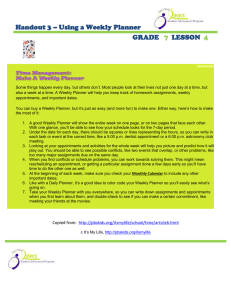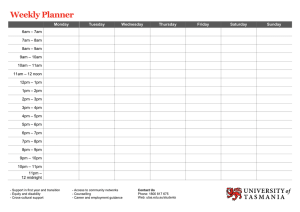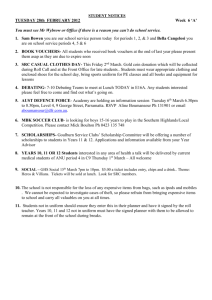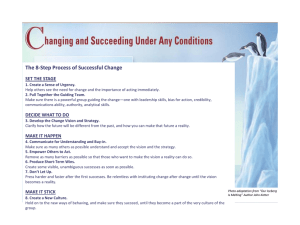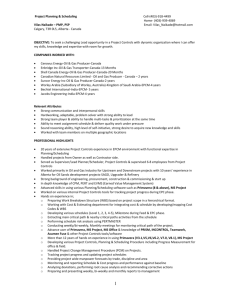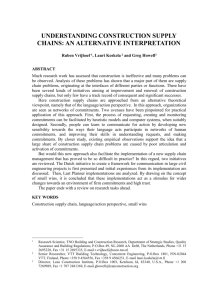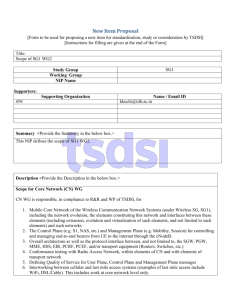Student lifestyle - creating a balance
advertisement
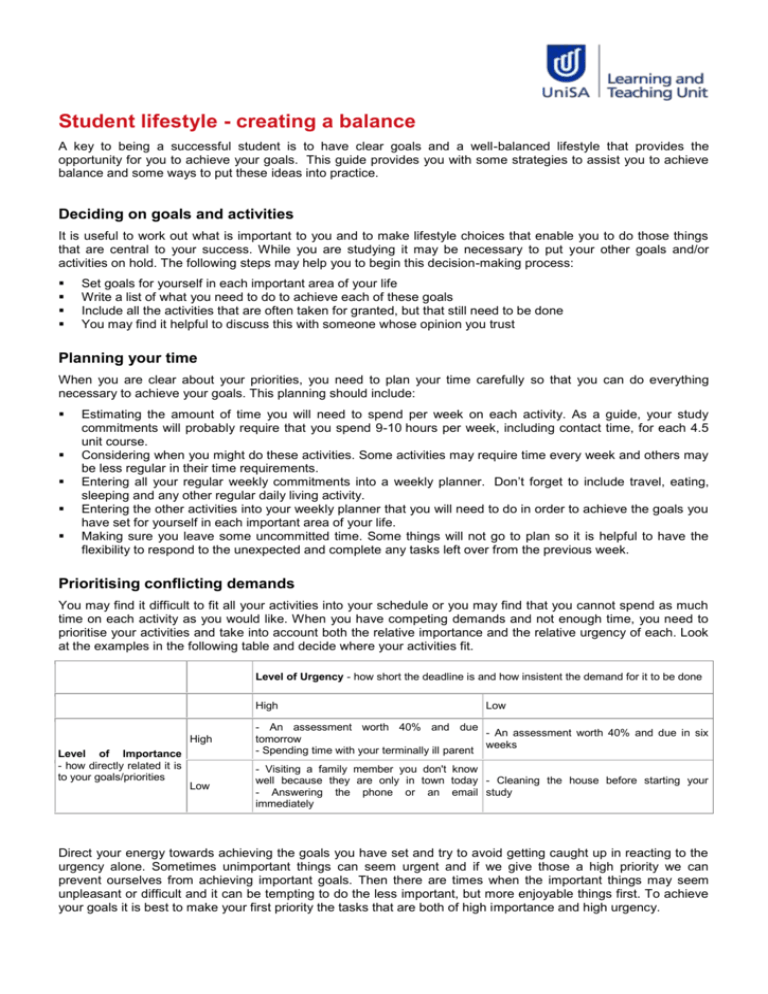
Student lifestyle - creating a balance A key to being a successful student is to have clear goals and a well-balanced lifestyle that provides the opportunity for you to achieve your goals. This guide provides you with some strategies to assist you to achieve balance and some ways to put these ideas into practice. Deciding on goals and activities It is useful to work out what is important to you and to make lifestyle choices that enable you to do those things that are central to your success. While you are studying it may be necessary to put your other goals and/or activities on hold. The following steps may help you to begin this decision-making process: Set goals for yourself in each important area of your life Write a list of what you need to do to achieve each of these goals Include all the activities that are often taken for granted, but that still need to be done You may find it helpful to discuss this with someone whose opinion you trust Planning your time When you are clear about your priorities, you need to plan your time carefully so that you can do everything necessary to achieve your goals. This planning should include: Estimating the amount of time you will need to spend per week on each activity. As a guide, your study commitments will probably require that you spend 9-10 hours per week, including contact time, for each 4.5 unit course. Considering when you might do these activities. Some activities may require time every week and others may be less regular in their time requirements. Entering all your regular weekly commitments into a weekly planner. Don’t forget to include travel, eating, sleeping and any other regular daily living activity. Entering the other activities into your weekly planner that you will need to do in order to achieve the goals you have set for yourself in each important area of your life. Making sure you leave some uncommitted time. Some things will not go to plan so it is helpful to have the flexibility to respond to the unexpected and complete any tasks left over from the previous week. Prioritising conflicting demands You may find it difficult to fit all your activities into your schedule or you may find that you cannot spend as much time on each activity as you would like. When you have competing demands and not enough time, you need to prioritise your activities and take into account both the relative importance and the relative urgency of each. Look at the examples in the following table and decide where your activities fit. Level of Urgency - how short the deadline is and how insistent the demand for it to be done High Low High - An assessment worth 40% and due - An assessment worth 40% and due in six tomorrow weeks - Spending time with your terminally ill parent Low - Visiting a family member you don't know well because they are only in town today - Cleaning the house before starting your - Answering the phone or an email study immediately Level of Importance - how directly related it is to your goals/priorities Direct your energy towards achieving the goals you have set and try to avoid getting caught up in reacting to the urgency alone. Sometimes unimportant things can seem urgent and if we give those a high priority we can prevent ourselves from achieving important goals. Then there are times when the important things may seem unpleasant or difficult and it can be tempting to do the less important, but more enjoyable things first. To achieve your goals it is best to make your first priority the tasks that are both of high importance and high urgency. Prioritising is about making choices and that can be difficult. Sometimes it means spending less time on certain activities and having to accept a less than ideal outcome. At these times it is important to remind yourself that you are doing the best you can in the circumstances and feel positive about the choices you make. Monitoring the balance The demands of life are not constant and ongoing attention is required if an appropriate balance is to be maintained. Your study workload has peaks and troughs and you need to be aware of these changing requirements so that you can adjust your time plan to meet the actual demands of each week. You can use a half yearly or study period planner to help you to plan ahead, by recording all of your courses' assessment tasks and other related and important activities on it. At the end of each week it is useful to reflect on how your timetable is working for you. If necessary, you can modify your goals and your weekly planner so that you make the best use of your time. Managing stress Sometimes events occur that were not expected and they can have significant consequences for the way we spend our time and energy. It is important to be aware that when dealing with the unexpected, along with competing demands and change, you may experience both positive and negative effects. These effects: may impact on more than one person provide opportunities produce stress need to be managed Maintaining motivation When the demands are great and stress levels increase it is easy to feel overwhelmed and difficult to find the motivation to focus on tasks such as study. Just when you need to be using your time most efficiently and effectively you may find that you are unable to concentrate and you look for things to do that will distract you from the tasks that seem so overwhelming. At these times it can help to: revisit and reaffirm your goals make study a high priority reward yourself each time you complete a task or achieve a goal use positive thinking to encourage yourself If you require further assistance, please make an appointment with a counsellor in the Learning and Teaching Unit on your campus.

